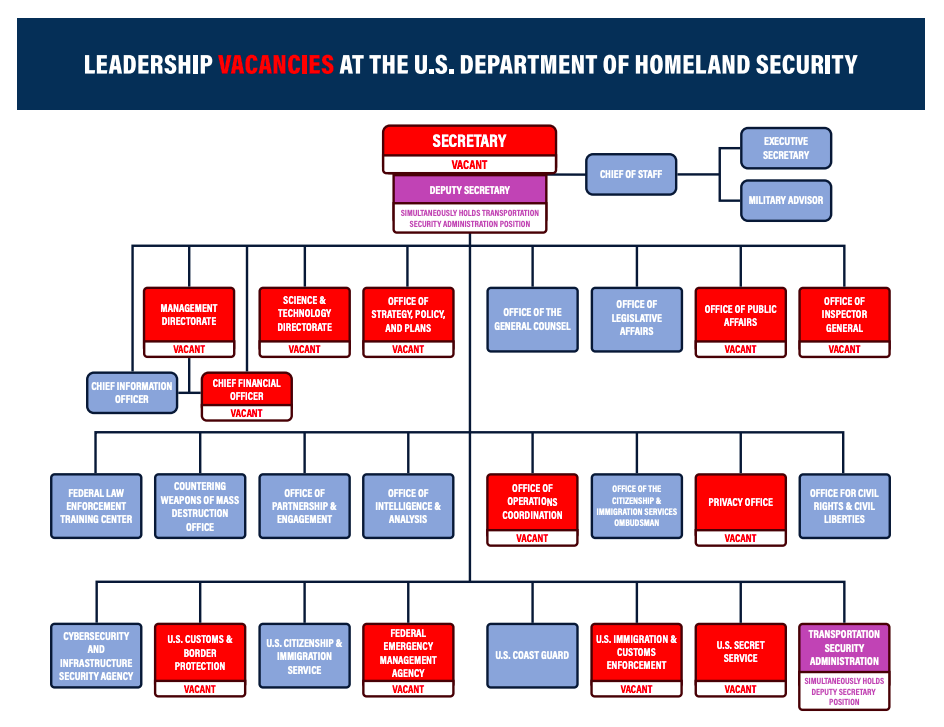House Democrats and Republicans are in agreement that the large number of senior leadership vacancies within the Department of Homeland Security are hurting the body’s ability to carry out its many missions.
“Put simply, since taking office President Trump has decimated the leadership ranks of his own Department of Homeland Security … there are another 50 senior leadership positions vacant throughout the Department, including those tasked with overseeing the daily operations of DH.,” House Homeland Security Chairman Bennie Thompson, D-Miss., said Tuesday, according to prepared remarks at a hearing on the effect of those vacancies.
Ranking Member Mike Rogers, R-Ala., said more than a dozen posts lack permanent holders. The U.S. comptroller’s office said eight of the roles that require Senate confirmation have acting officials serving, including the DHS inspector general office, chief financial officer, under secretary for management, under secretary for science and technology.
“The President has failed to nominate anyone to fill most of these vacancies, even though many have been held by acting officials for the entirety of the Trump Administration,” Thompson’s remarks state. “This chaos appears to be by design, orchestrated by a President who wants to be able to remove the Department’s leadership on a whim. He has said himself: “I like Acting[s] because I can move so quickly. It gives me more flexibility.” In other words, the President wants people who have not gone through the confirmation process because they are more beholden to him.”
Rogers said Thompson’s accusation falls in the face of similar vacancies during former President Barack Obama’s first year of his second term in office, though Trump has seen more turnover at DHS in his first two years in office than in Obama’s two terms combined.
“In 2013, during the Obama Administration, when 18 leadership positions lacked permanent leaders, then Chairman [Michael] McCaul convened a hearing to examine the issue,” Rogers said in a prepared statement. “At that hearing, then Ranking Member Thompson blamed an obstructive Senate minority for holding up key appointments; questioned how the morale of 240,000 employees could be adversely affected by leadership positions being filled by acting personnel; and strenuously argued that the best way to fix the morale problem at DHS was for Congress to act to reform the organizational structure of the Department.”

Since January, DHS has lost more than a handful of its most senior leaders, including Secretary Kristjen Nielsen, acting Deputy Secretary Claire Grady, acting Immigration and Customs Enforcement Director Ronald Vitiello, Federal Emergency Management Agency Administrator Brock Long, and Secret Service Director Randolph “Tex” Ailes.
In addition, Customs and Border Protection Commissioner Kevin McAleenan and Transportation Security Administration Administrator David Pekoske were pulled from their roles and promoted, leaving their posts vacant of permanent leadership.
Gene L. Dodaro, comptroller general of the U.S., warned in his opening remarks the long-term vacancies “could pose a challenge to addressing high-risk areas and priority recommendations that span DHS’s diverse missions.” The department was set up in 2003 and merged 22 agencies under one roof. Its 240,000 employees work on counterterrorism, border security, transportation security, immigration, cyberspace, election security, disaster relief, and other issues.
John Roth served as DHS inspector general until 2017. He said the many holes in DHS have the potential to “cripple” the department’s ability to move forward.
“First, those who hold the position in an acting capacity are simply in a caretaker role and are justifiably hesitant to make decisions that would tie the hands of the individual ultimately appointed to that position. Thus, long term strategic decision-making is deferred until someone is appointed,” Roth said, according to prepared remarks. “Second, a full leadership cadre of Presidentially-appointed, Senate confirmed officials increases political accountability, particularly as it relates to Congressional oversight.”
“Third, Presidential appointees are better able to represent the Department’s interests in interagency coordination. DHS leadership must continually coordinate and plan with other agencies on matters of homeland security,” he continued. “Finally, full-time political appointees can bring fresh perspectives and energy to a position. They are better able to reflect the administration’s policies, and often have a desire to drive specific issues to completion during their tenure.”
The committee requested White House Senior Policy Adviser Stephen Miller to testify about his role in the recent shake-up at the department. Miller declined.

